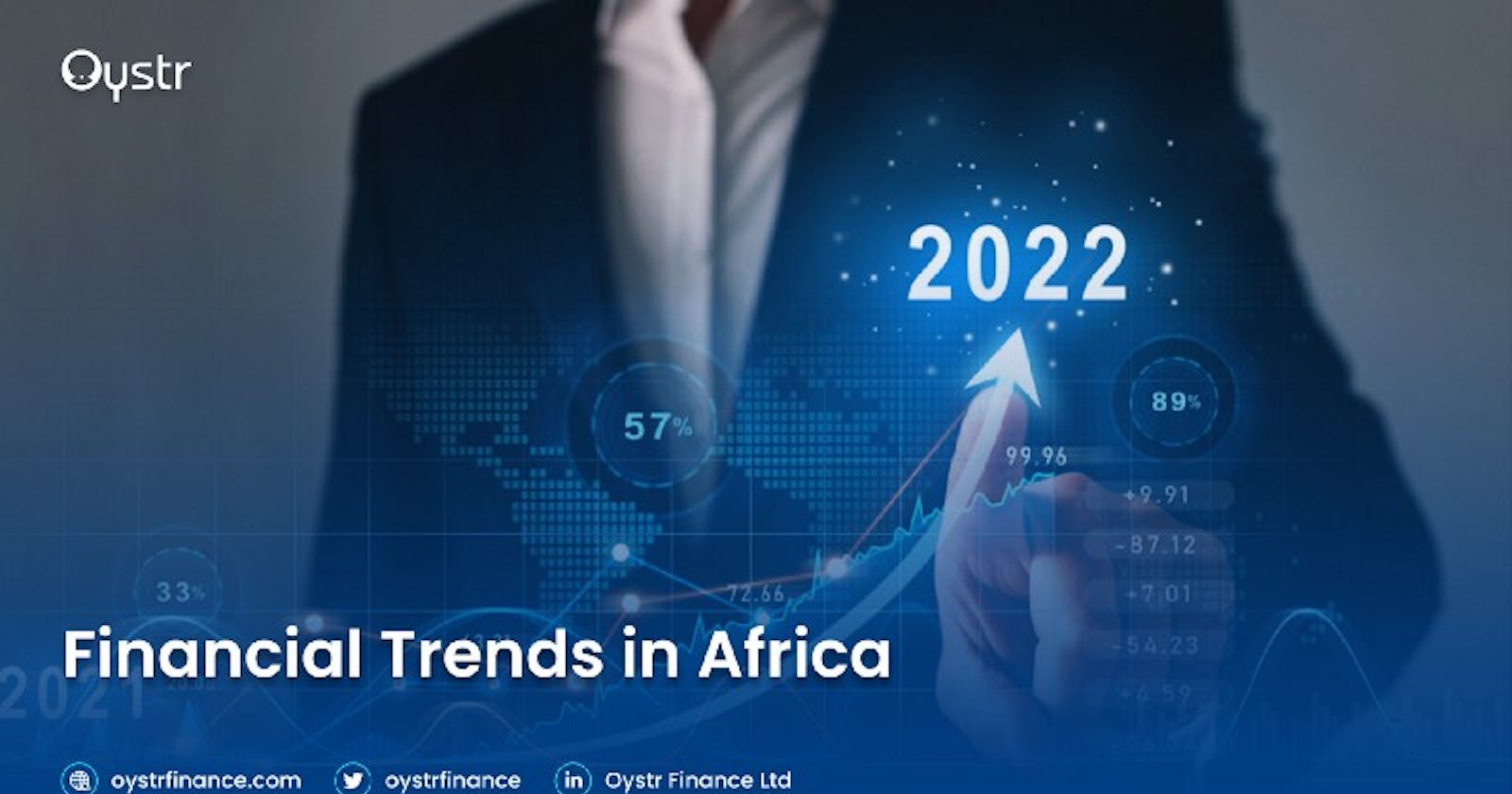In the last three years, the world experienced a considerable transition in trends across industries, particularly finance and the economy. The world, including Africa, transitioned into a “new norm” of operations.
The financial services industry stands at the forefront of change with innovations such as neo banks, decentralized finances, wealth tech, etc. The global financial ecosystem experienced a transformation that, since then, shifted the industry’s modus-operandi and opportunities towards the future. From banks and capital markets to investment management, the evolution of financial trends is worth exploring.
The year 2022 flows into its second quarter, and several financial innovations are going mainstream. With the intention to reveal emerging financial trends in the continent so far, twelve of them have been expounded.
FinTech Expansion
Fintech disruption of financial markets continues to expand in 2022. The fintech industry is predicted to witness phenomenal regional and global expansion. Merchant technology, open banking, digital banking, and wealth tech look promising for the continent’s most attractive industry.
In 2021, Africa saw record-breaking investments into tech startups, with Fintech topping the charts. In February 2022, the Fintech Association of Nigeria (FintechNGR) hosted the Fintech Outlook 2022. The speakers discussed the various sectors of the Fintech landscape. The intellectual conversations cut across payments, infrastructure, wealth tech, lending, startup scale, legal and regulatory framework, and cybersecurity. The outlook provided insights into the industry and revealed room for expansion this year.
Open Banking
In finance, open banking refers to the financial technology that enables regulated third-party access to customer financial data from financial institutions, such as banks, with the customer’s permission. It enables transparent, extensive, customer-centred financial activities and provides increased opportunities for market players.
Nigeria was the only African country to have released an open banking framework by 2021. However, in January 2022, up to six South African banks offered open banking services.
Mobile Money
Financial transactions in Africa gradually shift from cash-centred to mobile money.
From the origination of mobile money in Kenya in 2007, the continent recently recorded about 500 million mobile accounts. Although the numbers are debatable, especially with the possibility of opening multiple accounts, mobile money adoption is huge in Africa. Millions of mobile agents across Africa provide offline-to-online connections between cash and mobile wallet customers.
Moreover, the preference for online banking platforms as a channel of financial engagement constantly increases. As a result, banks have increasingly adopted a mobile-first strategy this year. This led to the rise in mobile-only brands and reinforced banking apps with chatbots, virtual assistants, and other features.
Digital Banking and Neo Banks
The momentum of the economy transitioned from physical to digital-first interactions, from branch-banking to neo-banks, and from product-centricity to digital consumer experiences. Fintech and big tech companies constantly disrupt the financial services ecosystem. Therefore, traditional banks and credit unions gear towards digital transformation and innovation at scale to keep up with the tides. More readily than ever, they embrace technological solutions that correspond with the neo-bank model. Today, customers tilt towards digital interaction with banks, and younger generations especially prefer to carry out activities like opening a deposit account on their mobile devices.
The growth of digital banks in Africa without physical branches showed traditional banks needed to go digital. Digital banks such as Tyme Bank, Kuda, Wave, Alat, and OPay increasingly depend on digital channels and ingenious agent models to cover more ground in the market. More so, the rate at which traditional banks are automating their processes rises increasingly. Accelerated by the COVID-19 pandemic, bank boards in Africa have prioritized digital transformation for 2022.
Embedded Financial Services
Embedded financial services trended over the previous year and continue to grow as numerous banks consider becoming financial service providers to non-financial institutions. The term embedded finance describes the provision of financial services such as payments, savings, investments, credit, and insurance, by non-financial institutions to their consumers. It offers traditional companies with a large client base the opportunity to serve their consumers with fintech solutions embedded in their service platforms. These solutions include Banking-as-a-service, Lending-as-a-Service, Agency-as-a-Service, open banking tools, BIN sponsorship, national payment switches, etc.
Embedded financial services streamline financial processes and bring different consumer needs together in one app or website. African fintech startups offer embedded financial services as non-traditional finance entities.
Embedded finance relieves fintech companies and financial institutions by helping to provide financial services and empowers businesses to pilot their finances.
A Nigerian digital bank, Yep! announced that it raised $1.5 million for its super financial app this year. In March 2022, Fidelity bank announced the launch of PayGatePlus. It offers Banking as a Service (BaaS) to meet the growing demand for embedded finance. PayGatePlus possesses features such as virtual accounts, web payments, online collections via NIBSS Instant Payment (NIP), funds transfer, direct debit, balance enquiry, statement, BVN validation, direct credit, and Buy Now, Pay Later.
Buy Now, Pay Later (BNPL)
E-commerce introduced buy-now-pay-later a few years ago. In 2021, BNPL companies attracted about 4 million dollars in investments as embedded credits rapidly gained ground across the finance industry. As its name implies, BNPL allows individuals to purchase goods and obtain instant possession with deferred payments. This includes making part payment of the cost while paying the balance over a predetermined period. This trend gained popularity across the continent due to the difficult economy, especially among consumers of assets such as mobile gadgets, electronics, etc.
In Africa, BNPL innovations include partnerships between payment platforms such as Flutterwave and credit companies to incorporate BNPL as a payment option for eCommerce transactions. Tyme Bank, an African digital bank, launched a BNPL solution and extended the service to SMEs towards the end of 2021. In November 2020, CredPal, one of the pioneers of BNPL in the continent, offered its customers access to credit cards. In March 2022, they also announced generating $15 million in bridge rounds to augment its consumer credit offerings in Nigeria and eventually across Africa.

Convergence of Industries
Nowadays, consumers desire to access everything using their mobile devices. Therefore, bank-fintech partnerships, finance-entertainment-telecom partnerships, and other inter-industry collaborations have marked the year 2022.
For instance, Nigeria in 2021 granted top African MNOs– MTN and Airtel, licenses to operate Payment Service Banks (PSBs). One of the impacts of this move is the increased adoption of mobile money as a payment option.
African innovators now focus on using technology to crack the continent’s biggest challenges in 2022. They are likely to steer a convergence between agriculture, healthcare, insurance, and finance industries, as well as tech.
Data Localization
The SARS CoV-2 and its various variants caused a decline in everything except data. It even increased the rate and volume of data generation. Data is an essential part of the finance industry; in fact, some say data is the new oil.
In 2022, data innovations such as DaaS, FiDaaS, alternative data, etc., are impacting financial institutions, including banks and businesses. The power of a financial institution’s access to data depends on real-time analytics. The result of properly analyzed data runs across an entire organization and positively influences everything from product development to back-office operations and personalized customer experience. The combination of big data with cloud computing, enhanced utilization, and new technology prevail as high-impact trends that have come to stay in Africa.
Connectivity and data empower Africa with critical opportunities, and the need for data localization has become increasingly recognized. The daily volume of data produced compel investments in data banks to store and utilize this information efficiently.
Oystr is a good example. It uses financial identity as a service (FiDaas) in providing financial inclusion to the underserved and enabling financial institutions to serve their customers better.. It leverages informal data to provide better insights to all financial institutions

Investment in Startups, Emerging Markets, and Underserved Populations
Telecommunication, FinTech, and Industrial companies indicate tangible growth opportunities for investment accounts in 2022. Investors are waking up to target financially underserved populations and, consequently, making more deals in emerging markets of Africa. In 2021, Mastercard launched inclusive cards with geometric notches to reach blind and partially-sighted persons. In 2022, they have partnered with various initiatives and companies to bridge the gap between financial services and the underserved in Africa.
More so, mobile money solutions and agent banking help financial institutions reach rural villages and urban neighbourhoods with zero access to physical bank infrastructure. Thus, the unbanked in these areas now have access to quick, reliable, and affordable financial transactions, including savings, credit, and insurance.
Cybersecurity
Risks of cyber and financial crimes accompany the digitization of financial services. Digital channels have increased exposure to attacks and critical points that require prioritization of cybersecurity, data protection, risk and compliance.
The finance industry experienced expensive data breaches in 2021, incurring an average of $5.72 million in losses. With sensitive information being stored mostly online, businesses, corporate bodies, financial institutions, and even individuals are vulnerable to cyber-attacks. As a result, cyber security remains an indispensable part of the advancing digital economy.
In 2022, regulators are tightening compliance to handle the surge of more sophisticated financial crimes. Organizations deploy advanced data analytics and AI technologies to secure their data and information. The security weaknesses introduced by the digitization of financial transactions and operations require innovative and proactive solutions. In 2022, securing new systems and getting rid of risks stand at the top of the priority list for sustaining the ever-increasing exploits in technology and finance.
Digital Currencies and Decentralized Finance
The economic instability in the continent drove several individuals and businesses to trade with digital currencies and decentralized finance. After its increased popularity in the last few years, cryptocurrencies have served Africans as a safe option to gain financial freedom and hedge their funds against the recession.
This expanded the adoption of cryptocurrency and blockchain technology for payment in Africa. In October 2021, Nigeria launched its Central Bank Digital Currencies (“CBDC”). The e-naira, the first CBDC in Africa, attracted favorable uptake in the market. By the end of 2021, the Central Banks of Tanzania, Ghana, Guinea, and South Africa expressed intentions to drive the issuance of their digital currencies. In 2022, Zambia also began testing and considering the viability of a CBDC, with Kenya trailing behind.
In addition to the race for CBDC by African governments, Africans continue to embrace more blockchain use cases, retail wealth tech, DeFi, and non-traditional assets. However, without external funding, experts claim that the CBDC moves toward a downhill.
Global Interactions
The recent ease of cross-border shopping brought about an increase in global online purchases. In Africa, Fintech solutions like Unlimit make cross-border payments easier than ever.
Traditional payment funnels pose significant hurdles for African businesses planning expansion and looking to scale into the arising opportunities for cross-border trade. Moreover, global banks increasingly regard working with Africans as a risk due to menaces such as money laundering and terrorist financing. Payment corridors in Africa face high costs, serious delays, a lack of transparency, and non-inclusive systems.
In 2022, Fintech has risen to the challenge in Africa. Verto scales cross-border payments and bridges the international business payment clearings through a B2B payment platform. Thus, they facilitate global payments for international corporations, financial institutions, e-commerce businesses and marketplaces, including import and export traders. More so, the African Export-Import Bank formulated the Pan-African Payment and Settlement System (PAPSS) in January 2022. Predicted to save the continent over $5 billion in transaction costs annually, PAPSS domesticates intracontinental payments into one interoperable and affordable network. Pleasurably, it helps African currencies maintain value in cross-border transactions.
Additionally, with Africa’s growing young workforce taking up remote jobs in other countries, the export of labour between the continent and nations will increase in 2022. This also impacts financial interactions between Africa and the global markets.
Final Note
The COVID-19 pandemic, recurring lockdowns, and post-pandemic recovery drive innovation worldwide. The resulting surge in technological adoption and demand for digital products and services across industries raises a new problem. This has led to the eruption of new solutions, ideas, possibilities, and trends.
In Africa, the growing tech-savvy Gen Z population and innovative big tech companies highlight trends of 2022. In light of the global financial trends, Africa pursues not too far behind. If Fintech investments in Africa continue at their all-time high, the continent likely stands at the brink of an explosion of innovations with deep global impact.
Want to leverage informal data as a financial institution? Visit us to get started

